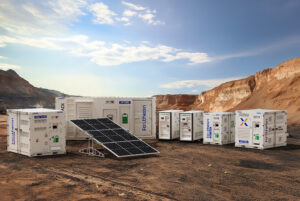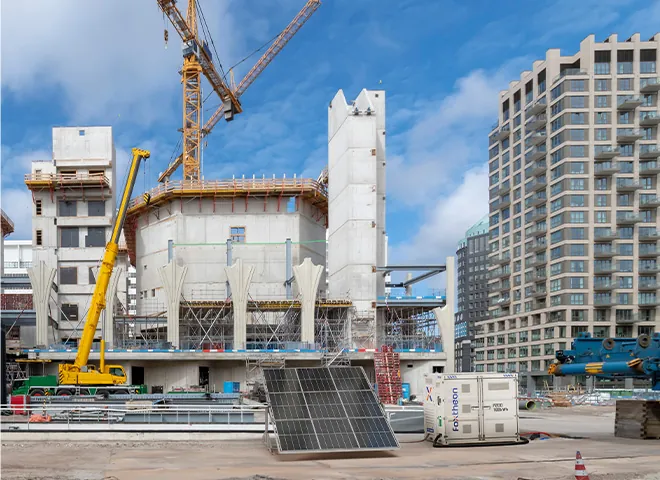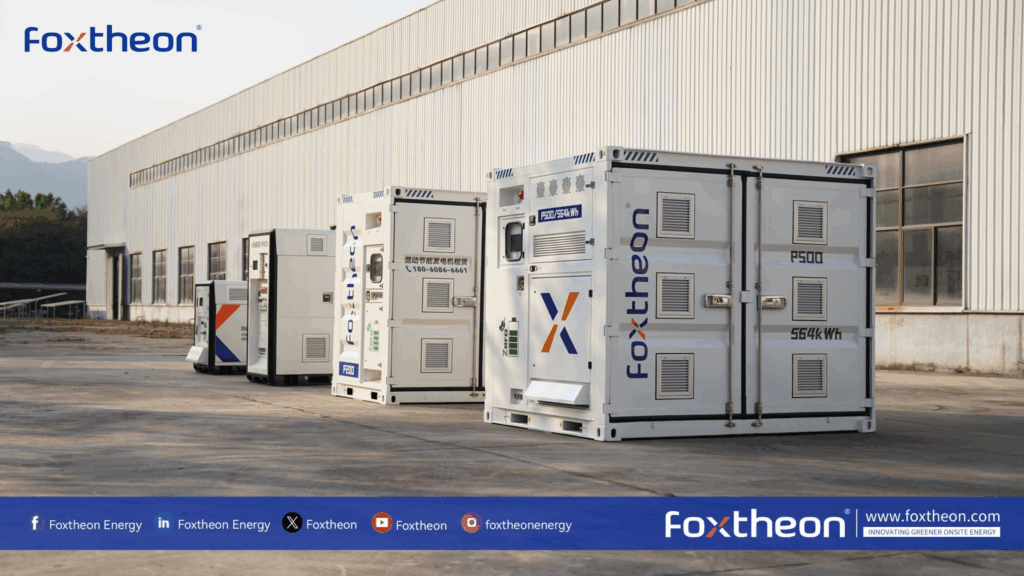
Imagine this: it’s 8 PM, your crew is working against a tight deadline, and suddenly, a city official arrives with a cease-work order. The reason? Noise complaints from the constant hum of your diesel generator. In cities across the globe, this isn’t a hypothetical scenario; it’s a growing reality. Stricter regulations on noise and emissions are putting urban construction projects under unprecedented pressure.
For construction managers and equipment rental companies, these rules are more than a headache—they’re a direct threat to timelines and budgets. But what if you could turn this regulatory pressure into a competitive advantage? What if you could power your site efficiently, quietly, and cleanly, keeping regulators and the community happy?
That’s where hybrid energy storage comes in.
💡 Q&A: What is a hybrid energy storage system?
The Walls Are Closing In: The New Reality of Urban Regulations
The days of running a diesel generator 24/7 in a city center are numbered. Municipalities worldwide are cracking down, creating a complex web of rules that can halt a project in its tracks.
The War on Noise 🤫
Construction is loud, but cities are demanding quiet. A standard diesel generator can easily roar past 85-100 dB(A), far exceeding new, stricter limits.
● Shrinking Timetables: Cities like Toronto now prohibit noisy construction near sensitive zones after 7 p.m.
● Drastic Limits: In places like Larkspur, California, noise limits in residential zones can drop to as low as 40 dBA at night—quieter than a library. Relying solely on a traditional generator makes compliance nearly impossible during these crucial evening and overnight hours.
The Push for Cleaner Air 🌬️
The regulatory focus extends beyond noise. Air quality is a top priority, and diesel emissions are a prime target.
● Fossil-Fuel Free Mandates: Leading the charge, Oslo, Norway, has mandated that all municipal construction sites be fossil-fuel-free by 2025. This isn’t a distant dream; by 2023, 98% of machine hours on the city’s projects were already powered by clean energy. This trend is spreading globally.
● Costly Upgrades: For projects still reliant on diesel, this means facing expensive retrofits with advanced exhaust after-treatment systems or phasing out older, non-compliant equipment entirely.
For contractors and rental companies, the message is clear: adapt, or risk being shut down.
💡 Q&A: How does the P500 system actually reduce noise and emissions?
The Smart Solution: Meet the Foxtheon P500 Hybrid System
Instead of fighting against the tide of regulation, the Foxtheon P500 Hybrid Energy Storage System allows you to work with it. The P500 is not just another piece of equipment; it’s your key to unlocking operational freedom in the most restricted urban environments.
By pairing a battery storage unit with a standard diesel generator, the P500 transforms your site’s power supply into a smart, efficient, and—most importantly—compliant system.
● Run Silent, Run Clean:
The P500’s battery provides power during periods of low load or during restricted hours (evenings, nights, weekends). The generator only kicks in to handle peak loads or recharge the battery, drastically cutting its total runtime. This means silent, zero-emission operation when you need it most.
● Slash Fuel Costs & Maintenance:
Less generator runtime directly translates to significant fuel savings and reduced engine wear. The P500 lowers your operational expenses, delivering a compelling return on investment that goes straight to your bottom line.
● Eliminate Compliance Headaches:
With the P500, meeting strict noise and emission ordinances is no longer a challenge. You can confidently schedule work, avoid fines, and prevent costly stop-work orders. It’s peace of mind, delivered.
Case: Putting the P500 to Work
Over an 18-month project period, that translated into thousands of dollars in fuel savings, a dramatic reduction in CO₂, and zero noise complaints — proof that hybrid systems like the P500 make urban compliance both achievable and profitable.
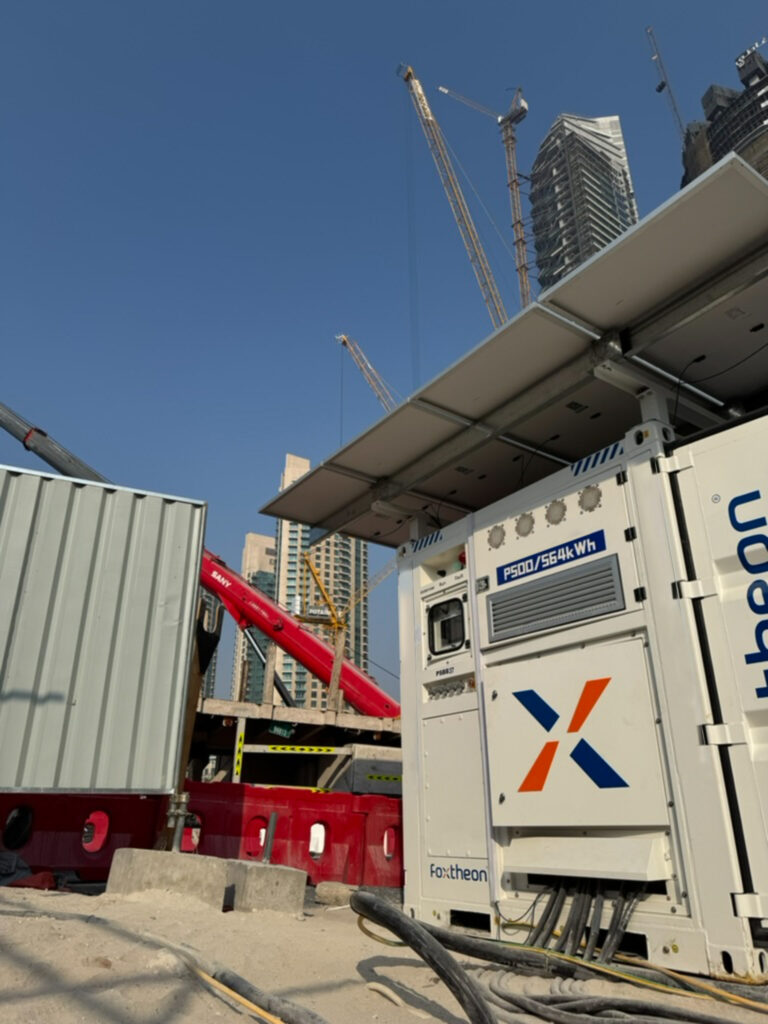
So, how does this translate to a real project? Here’s a recent example from Dubai.
📍 Client: A general contractor for a landmark commercial building in Downtown Dubai.
⚙️ Challenge: Supplying 24/7 power for a major construction site while meeting Dubai’s strict noise and emissions regulations — a task impossible with conventional diesel generators.
🔋 Solution: A Foxtheon EnergyPack P500 was deployed as the primary power source, forming a smart hybrid microgrid together with a 275 kVA diesel generator and a 3 kW solar array.
🌟 Key Results:
Generator runtime cut by nearly 80% — from 24 hours to just 5 hours per day.
Daily fuel consumption reduced by 49%, saving 197 liters of diesel per day.
Annual CO₂ emissions down by 193 metric tons — equivalent to removing 42 cars from the road.
Achieved 19 hours of silent operation daily, eliminating noise complaints and improving site conditions.
💡 Q&A: Is the upfront cost of a hybrid system like the P500 worth it?
Turn Regulatory Headaches into a Competitive Edge
In an era of tightening urban regulations, simply having the right tools is no longer enough. You need the smartest tools. The Foxtheon P500 is more than a power solution—it’s a business strategy. It allows you to bid on projects others can’t, operate with confidence in the strictest environments, and future-proof your fleet against tomorrow’s regulations.
Don’t let noise ordinances and emission mandates dictate your project’s success. Take control.
Planning a project in a city with strict regulations? Contact our team today for a customized analysis and see how the P500 can turn compliance pressure into your next big win.
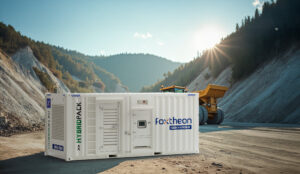
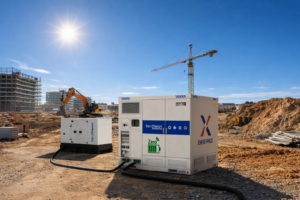
Mining Crusher Power Solution: Reducing Cost & Ensuring Uptime
